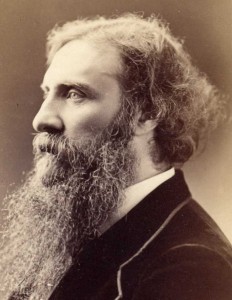 GEORGE MACDONALD (1824-1905), forerunner of the Inklings–Scottish minister, poet, novelist, and imaginative seer– was one of the most beloved Victorian authors throughout Great Britain and the U.S. in the 19th century. He wrote some 50 volumes of novels, poetry, short stories, fantasy, sermons, and essays. His influential body of work placed him alongside his era’s great men of letters and his following was vast. Two decades after his death, his books were pivotal in leading C.S. Lewis to Christianity. He thus became the foundational member of Wheaton’s Wade Center “Seven.”
GEORGE MACDONALD (1824-1905), forerunner of the Inklings–Scottish minister, poet, novelist, and imaginative seer– was one of the most beloved Victorian authors throughout Great Britain and the U.S. in the 19th century. He wrote some 50 volumes of novels, poetry, short stories, fantasy, sermons, and essays. His influential body of work placed him alongside his era’s great men of letters and his following was vast. Two decades after his death, his books were pivotal in leading C.S. Lewis to Christianity. He thus became the foundational member of Wheaton’s Wade Center “Seven.”
After his death, most of MacDonald’s books eventually went out of print as his name drifted from memory. However, he continued to be revered by an impressive gallery of well-known figures, including G.K. Chesterton (who referred to him as “one of the three or four greatest men of the 19th century”), W.H. Auden (calling MacDonald “one of the most remarkable writers of the 19th century”), and Oswald Chambers (“…how I love that man!”). In spite of such a following, however, MacDonald’s reputation gradually declined throughout the 20th century.
MacDonald’s most notable champion of the last century was C.S. Lewis, whose journey from atheism to Christianity was sparked by George MacDonald’s prophetic view of God. Lewis persistently acknowledged his debt to MacDonald, whom he called his “master.” Lewis wrote: “I dare not say that he is never in error; but… I know hardly any other writer who seems to be closer… to the Spirit of Christ Himself… I have never concealed the fact that I regarded him as my master, indeed I fancy I have never written a book in which I did not quote from him.” Both in his autobiography and throughout his writing career, Lewis emphasized that George MacDonald was the most significant impetus in his own spiritual pilgrimage.
MacDonald’s writings can thus be seen as the spiritual soil out of which the faith of C.S. Lewis emerged. MacDonald’s novels, fantasies, and fairy tales provide the imaginative foundation for Lewis’s later writings, including the Chronicles of Narnia.
In spite of his own popularity, however, the spiritual roots of Lewis’s faith remain largely unknown. Lewis’s words of 65 years ago are still true today, “It has not seemed to me that those who have received my books kindly take… sufficient notice of the affiliation [with George MacDonald].” Notwithstanding Lewis’s frequent emphasis on the Scotsman’s influence in his own life, MacDonald’s name in the late 20th century drifted into obscurity and his books became unavailable.
A resurgence of interest in the forgotten Victorian began to mount in the 1970s and 1980s, given initial impetus by Wheaton’s Wade Center and the work of two Wheaton professors, Dr. Clyde Kilby, founder of the Center, and Dr. Rolland Hein, who released several editions of MacDonald’s sermon extracts. MacDonald’s name then exploded into public view in the years following, largely from the efforts of MacDonald redactor and biographer Michael Phillips. Building upon the efforts of Kilby, Hein, and others, and inspired by them, Phillips’ work resulted in a new generation of readers discovering anew the treasures in MacDonald’s stories, and led to a renewed publication of MacDonald’s books on an unprecedented scale not seen since his own lifetime.
Now more than ever, thousands the world over are discovering why Madeleine L’Engle called George MacDonald “the grandfather of us all–all of us who struggle to come to terms with truth through imagination.”
For contents of “George MacDonald” page, see TABLE OF CONTENTS and click on diamonds and crosses to see complete listing.